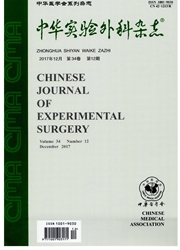

 中文摘要:
中文摘要:
目的探讨三肽化合物酪丝缬肽(YSV)对人肝癌细胞SMMC-7721裸鼠移植瘤的抑制作用及其抗血管生成机制。方法建立人肝癌SMMC-7721裸鼠移植瘤模型,免疫组织化学法观察YSV对肿瘤组织中微血管密度(MVD)的影响;应用血管生成相关基因芯片分析YSV对肿瘤组织血管生成相关基因的影响;应用逆转录-聚合酶链反应(RT—PCR)验证相关基因的表达情况,最后酶联免疫吸附试验(ELISA)法测定血清中目的因子的含量。结果YSV能显著抑制人肝癌SMMC-7721裸鼠移植瘤的生长,当给药剂量为320μg/kg·d^-1。时效果最为显著,抑瘤率为60.66%。免疫组织化学法证实YSV能够降低肿瘤组织中微血管密度,YSV作用组MVD平均值36.0±11.6,对照组平均值为114.5±26.5。与生理盐水组比较,在113个候选基因中有18个基因下调2倍以上,其中血管内皮生长因子(VEGF)与白细胞介素(IL)-8基因下调最显著;RT—PCR法证实YSV能够抑制肿瘤组织中VEGF与IL-8在mRNA水平上的表达;ELISA亦证明YSV作用组血浆中因子VEGF及IL-8浓度降低。结论YSV能显著抑制人肝癌SMMC-7721裸鼠移植瘤生长,通过抑制肿瘤组织中促血管生成因子的表达来发挥抗肿瘤活性。
 英文摘要:
英文摘要:
Objective To investigate the inhibitory effects of tyroservatide (YSV) on human hepatocarcinoma SMMC-7721 transplanted tumor in nude mice, and explore the antiangiogenie mechanism. Methods Transplanted tumor model was established by implanting human hepatocareinoma cell SMMC- 7721 into nude mice. The microvessel density ( MVD ) of tumor was observed by immunohistochemical staining. Angiogenesis-related gene expression profile in tumor tissue was assayed by Oligo gene chips. Reahime PCR and ELISA were used to verify the results of gene chips. Results At dose of 320 μg/kg · d ^- 1 YSV significantly inhibited the growth of tumors, with inhibitory rate of 60.66%. Immunohistochemical staining revealed that YSV decreased the MVD of tumor tissue. Among 113 genes related with angiogenesis,18 genes were significantly down-regulated in YSV group. The leading ones were VEGF and IL-8, which was verified by reahime PCR and ELISA. Conclusion YSV significantly inhibited the growth of transplanted tumor in nude mice. Its antitumor activity was achieved by inhibiting the expression of angiogenesis-related factors.
 同期刊论文项目
同期刊论文项目
 同项目期刊论文
同项目期刊论文
 Clinical phase I trial of autologous cytokine-induced killer cells in patients with various carcinom
Clinical phase I trial of autologous cytokine-induced killer cells in patients with various carcinom Reconstructing JAK/STATs signaling pathway restored the anti-proliferative response of MHCC97 on Int
Reconstructing JAK/STATs signaling pathway restored the anti-proliferative response of MHCC97 on Int 期刊信息
期刊信息
